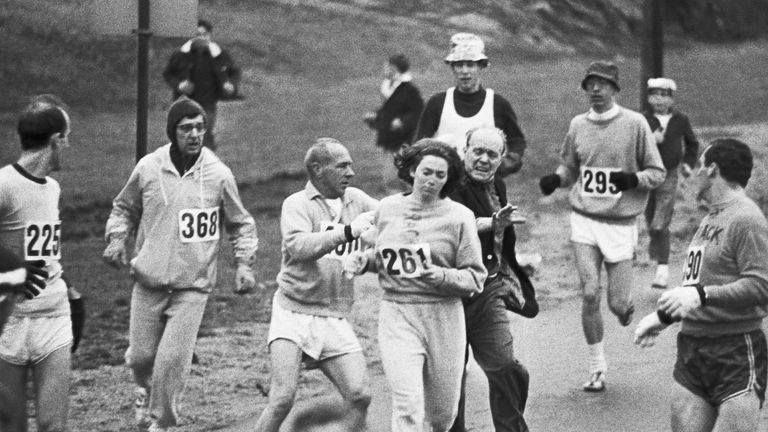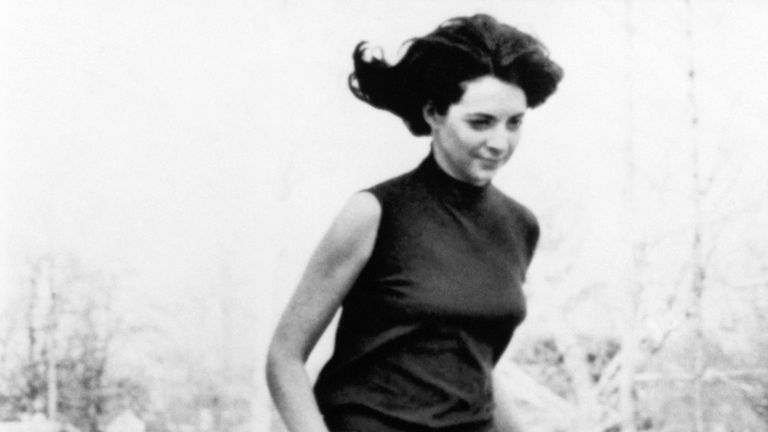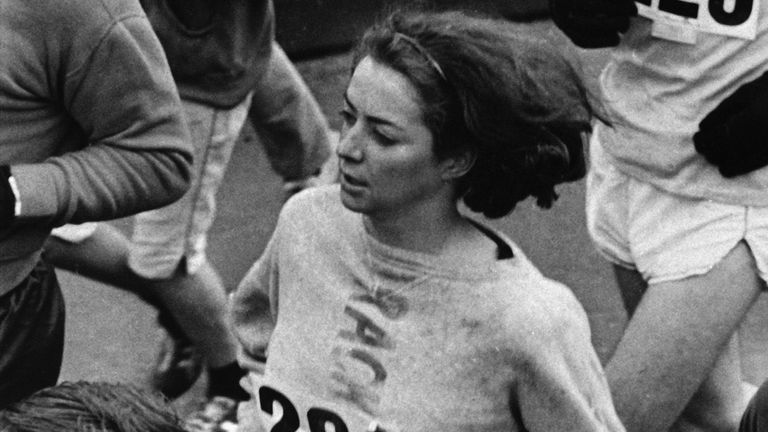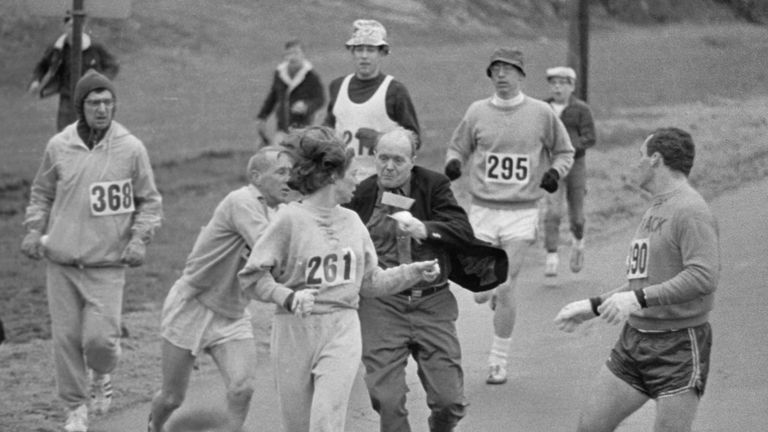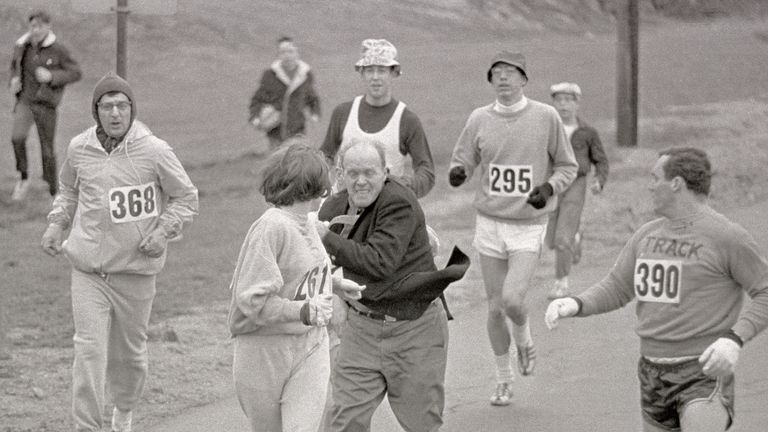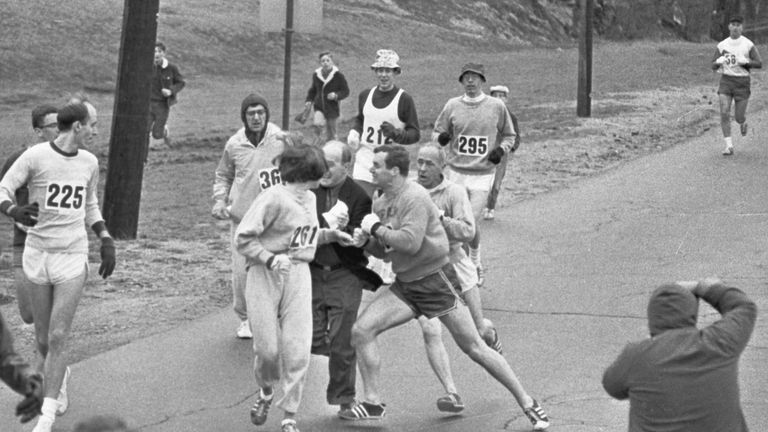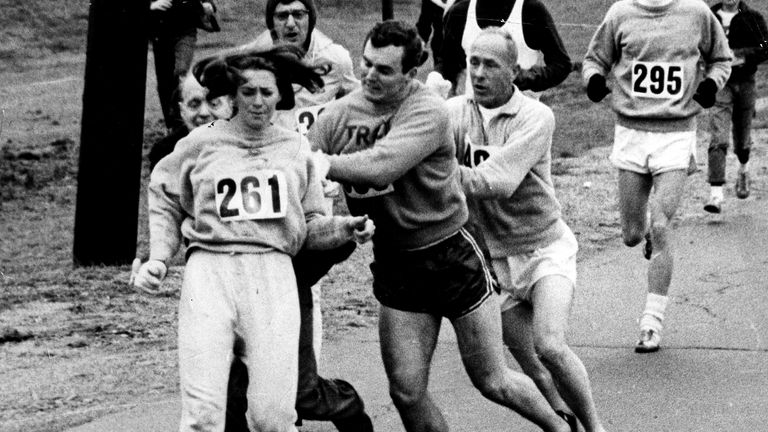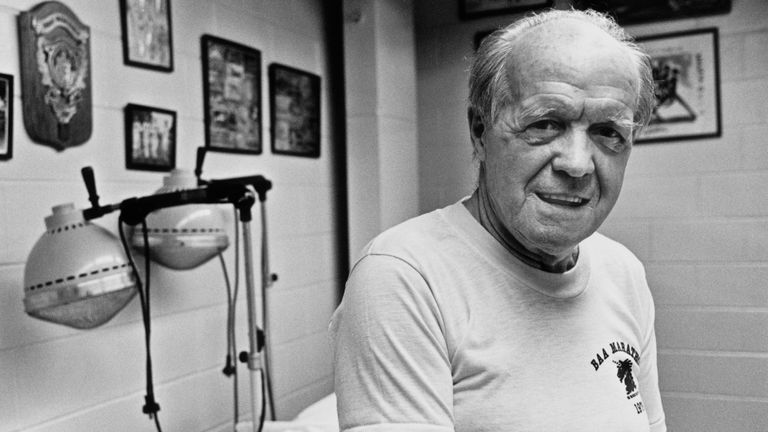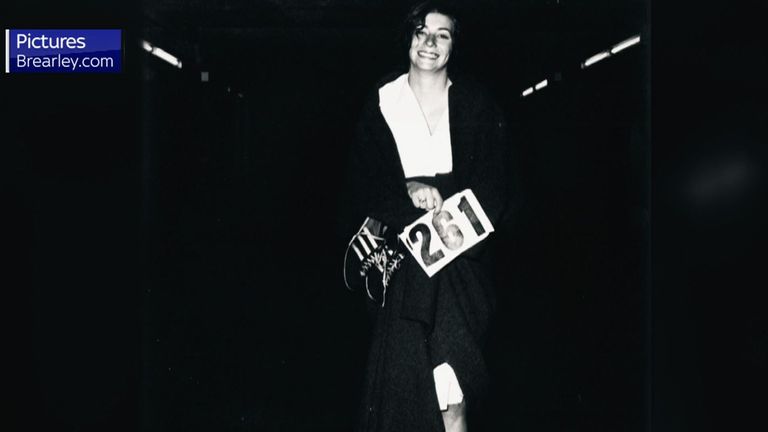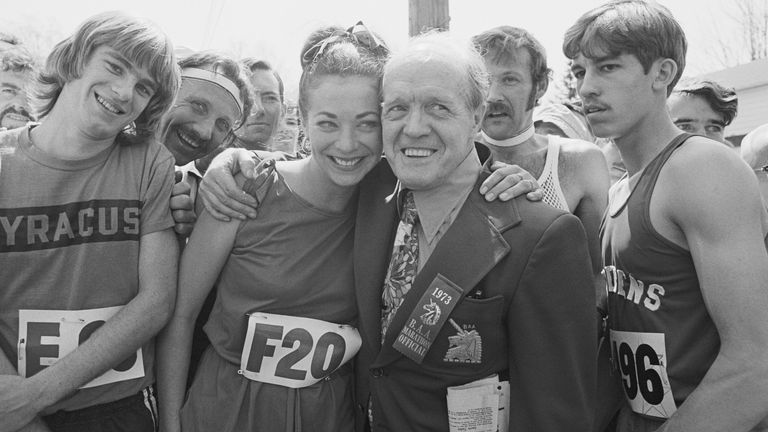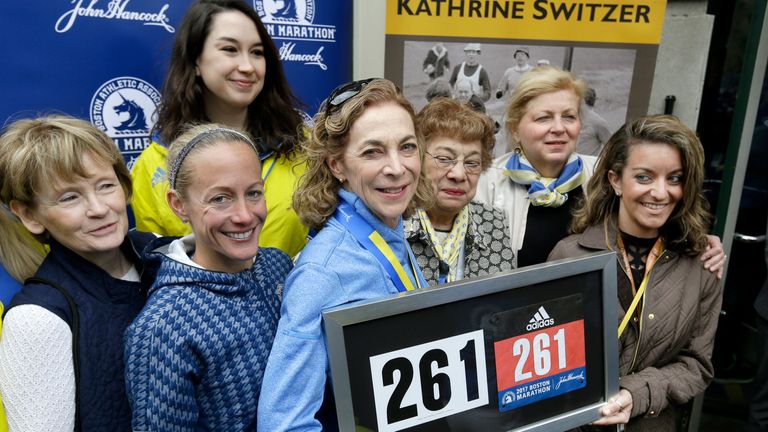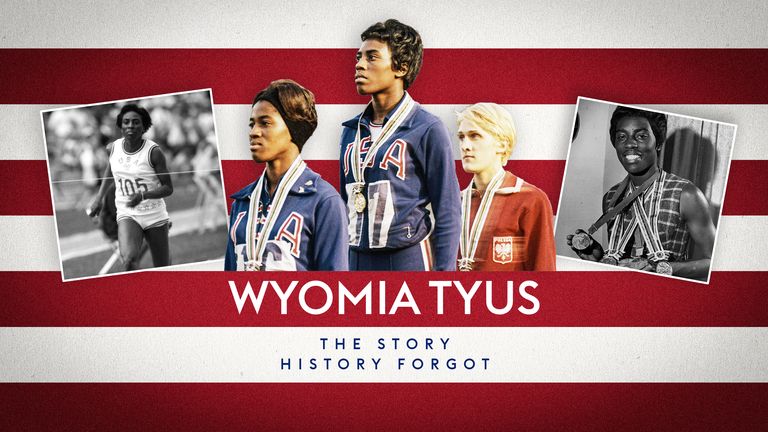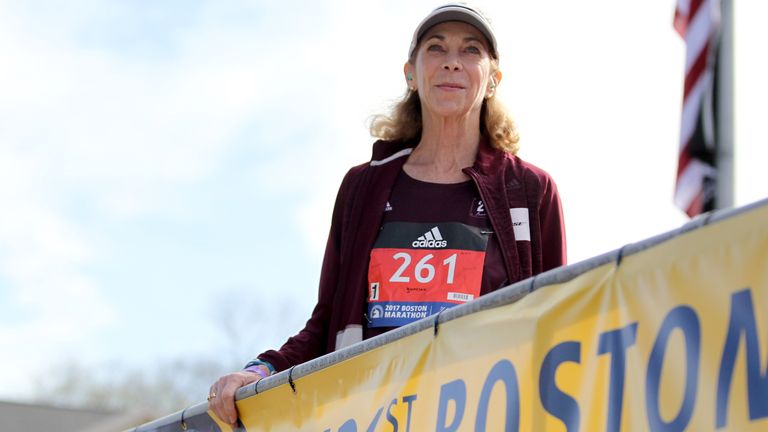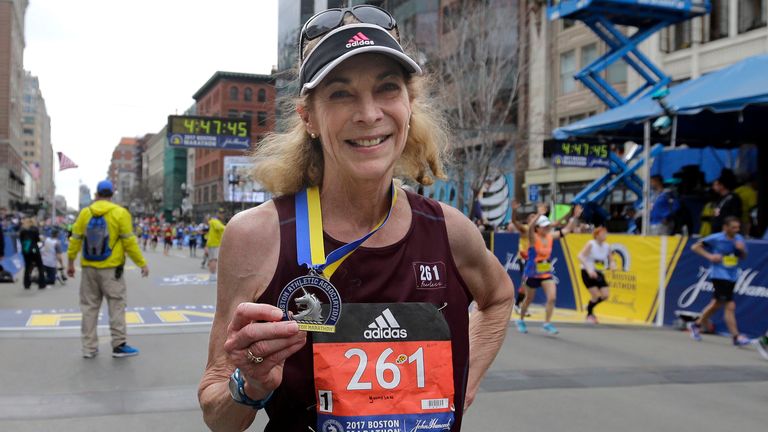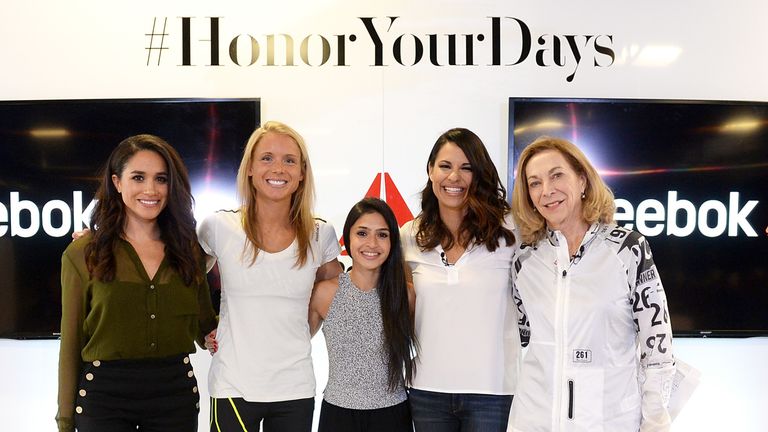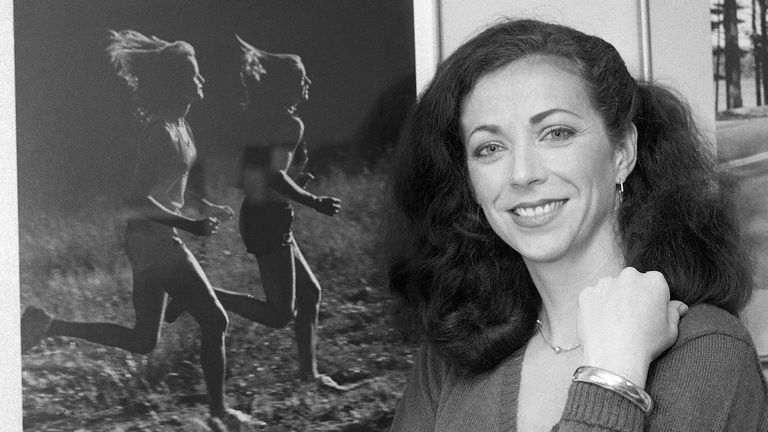Kathrine Switzer: First woman to officially run Boston Marathon on the iconic moment she was attacked by the race organiser
Kathrine Switzer was involved in an iconic moment at the 1967 Boston Marathon; she was attacked by race director Jock Semple who tried to throw her out while she was running, but the pair later became good friends; Switzer explains how that day revolutionised women's running
Wednesday 15 December 2021 09:37, UK
Kathrine Switzer became the first woman to officially run the Boston Marathon despite being attacked by the race director who tried to physically pull her out of the race because she was a woman. She remembers the famous moment, explains why it is still relevant and talks about women's safety in 2021.
In the 1960s, Switzer says there was a negative view of women who did exercise like long-distance running, which was based on myths.
"The perceptions of women back when I was running - amazingly enough just 53 years ago - were that you were going to get big legs, grow hair on your chest, your uterus was going to fall out," she told Sky Sports News.
"And it was widely perceived that it was really quite socially objectionable for women to participate in sports because they looked arduous. It looked like they were working hard, they were sweating.
"And of course, most women were very frightened of that image because their whole being was about being feminine, and attracting the opposite sex, and being accepted. I thought they were missing out on this wonderful sense of speed and strength, and really empowerment."
Switzer loved running and was coached by ex-marathon runner Arnie Briggs - a volunteer coach at Syracuse University - who took 19-year-old Switzer "under his wing". After hearing his marathon tales, Switzer grew impatient and told him she wanted to run the Boston Marathon.
"He said a woman couldn't possibly do it and we had this really big argument after he said women are just too weak and too fragile to go 26.2 miles. I said women in history have run marathon distances," Switzer said in an exclusive interview from New Zealand.
"I said women in history have run marathon distances, including a woman at Boston the year before who ran the marathon. She wasn't official, but she still did it and he just wouldn't believe it."
In 1966, Bobbi Gibb was the first woman to run and complete the Boston Marathon but the 23-year-old hid in a bush near the marathon start line and disguised herself in a hoodie after she was disqualified from officially entering the race because of her gender.
Switzer said Briggs finally changed his mind and said "if any woman can do it, you can do it, but you'll have to show me in practice, and if you can, I'll be the first person to take you to Boston." Switzer proved her endurance by running the distance plus an extra five miles.
She entered with her initials K.V. Switzer which she says was not a deliberate way to disguise her identity but the way she always signed her name. Unlike Gibb and because her gender was not clear on the entry form, her official registration was approved after paying a $2 entry fee.
What really happened in the marathon?
Over 600 runners started the Boston Marathon on April 19 in 1967, in cold, wet, and breezy conditions.
Switzer said: "You can imagine at the start of the marathon, everybody was happy and laughing and cheering, and really very supportive of me. All the guys were wonderful."
But the situation completely changed just over two miles into the race.
"Then came the beep-beep of the press truck and when it went by us, all the photographers at the back of the truck saw that I was a woman and wearing bib number 261 and kept filming me, and shouting at me: 'What are you doing in the race? What are you trying to prove?' I thought that was really strange.
"And all of a sudden alongside the press bus was another bus that was filled with the officials, and on this bus was the race co-director, a feisty Scotsman named Jock Semple.
"He had a reputation for being very feisty. Also, the journalists on the bus were teasing him, saying that there's a girl in your race and he lost his temper. He had a short fuse anyway but he jumped off this bus and ran after me.
"He ran up behind me, and I heard his leather shoes at the last minute - you can hear the difference - and when I turned, this fierce face was right in my face and he screamed at me and said: 'Get the hell out of my race and give me those numbers!' And he's ripping at my numbers and trying to pull them off.
"And I [shrieked] and tried to get away and he grabbed me by the shirt and started pulling me back. My coach said: 'Leave her alone, she's OK, I've trained her.'
"He grabbed the corner of my number 261 on the back of my shirt and it was like a bad dream, and I was trying to get away. And then suddenly my boyfriend (Tom Miller), who was running alongside me and was an ex-all-American football player and weighed 235lbs, came and smashed the official with a shoulder charge and sent him flying.
"We all got scared but my coach just said run like hell and we all went running down the street flying past the press truck, and the press truck was accelerating and screaming at me, saying: 'What are you trying to do? When are you going to drop out?'
"And I was so afraid. I'm so full of confidence now but at that moment, I had just turned 20. As a girl, I wasn't trying to prove anything. I had proved to Arnie that I could do the distance and the reward was to go to Boston.
"I just couldn't understand why he (Semple) was so angry and then I thought maybe I had done something wrong. But at that moment, I got really angry myself, which was great because I turned to my coach and I said, 'I'm going to finish this race on my hands and knees if I have to.'
"Because if I don't finish this race, nobody's going to believe women can do it and they're not going to believe women deserve to be here. I have to finish this race."
Switzer did finish the race becoming the first woman to register and complete the Boston Marathon.
She remembers the end very clearly. "By the time we finished four hours and 20 minutes later, the journalists were very crabby and very aggressive because they'd been standing on the cold waiting for the girl to finish. 'What are you trying to prove? Are you a suffragette or are you a crusader? You're never going to run again.'
"I was only 20 years old. I said things like: 'We'll be back and we'll be back again and again, and if our club is banned, we'll form a new club.'
"And then I said to the guy who said I'd never run again, 'someday you're going to read about a little old lady who's 80 years old, who dies in Central Park on the run. And I said, 'It's going to be me. I'm going to run for the rest of my life!' And he goes… 'Whoa…!'
"You have to understand that this was the beginning of the era of the second great feminist movement of the 60s and people were always criticising women, saying they were barging into places where they were not welcome and that they can't do it anyway.
"And I suddenly realised that is what they were trying to make me do, they were going to try to throw me out of the race to prove that I couldn't do it. Well, I knew I could do it - I had run 31 miles in practice!"
After the race, Switzer said she received plenty of hate mail but also a lot of fan mail. She decided to throw out the negative comments and keep the positive ones as inspiration to keep campaigning for change.
What happened next with Jock Semple?
It took five years before women were officially allowed to run the Boston Marathon in 1972.
"It took Jock (Semple) five years of watching women running, and finally, when they were official, he had to realise that they were serious and that they too loved running and that they were good," Switzer said.
The following year Switzer came face to face with Semple. But this time, the photo made the newspapers for different reasons.
She said: "He came up to me in the start line of the race the next year, and he didn't say he was sorry, but he put his arm around me and gave me a big kiss and he turned me to the TV cameras.
"And I can't do a Scots brogue, but I'll try. He said, 'Come on lass, let's get a bit of notoriety!'
"And the picture of him kissing me was in the New York Times the next day with the headline that said 'The end of an era'.
"Meaning if Jock Semple is going to welcome Kathrine Switzer into his race, times have truly changed. So we became really good friends. He didn't say, 'Look, I'm really sorry I did that.' That's OK. That was enough for me."
The pair did interviews together and remained good friends until his death in 1988.
"I went to see him just before he died. And people say, woah - that's a lot of forgiveness.
"But you know what? How can you not love somebody who not only changed your life in such a positive way, even though it started off negatively, but changed millions of women's lives?
"That photograph is one of the greatest photographs in the women's rights movement and certainly even in the civil rights movement."
Switzer said she saw "a big opportunity" to increase women's running around the world.
She said: "If I could create the opportunity for them, I know I knew they would come, but they just were afraid - they needed a non-intimidating, welcoming environment to participate in.
"And I began the drive with other women to get women officially in the Boston Marathon. Which we did. And also then to get them into the Olympic Games. And I would say that was really a highlight of my career.
"It took me 10 years, but we were very successful."
Switzer has organised a global series of 400 women's races in 27 countries and was instrumental in getting the women's marathon added to the programme of the Olympic Games in 1984.
She has fond memories of setting up a marathon in London 41 years ago which led to the official London Marathon that still runs every year.
"We had a major marathon in London in 1980 which was the year before the London Marathon [was officially started]," she added. "The International Olympic Committee required 23 countries and four continents to participate in the Olympic Games, and we had 27 countries and five continents.
"And so we exceeded the Olympic requirement and got voted into the Olympic Games marathon for women in 1984.
- Paula Radcliffe: The One That Got Away
- Sky Sports partners with Women's Sports Collective
- Hodgkinson: Honour to be compared with Dame Kelly Holmes
"But one of my greatest moments of pride, of course, was closing downtown London streets for the first time in history for a sports event and to see that race then went on to become what is now the great London Marathon.
"So that was an amazing achievement all the way around. And I'm so particularly tickled because it's the women who did it."
Running the Boston Marathon 50 years later
Switzer followed up her love of running and won the 1974 New York City Marathon, although she admits she was never quick enough to be an elite runner.
In 2017, 50 years after her memorable first experience, she ran the Boston Marathon again at the age of 70.
Running with her original number 261, she finished in four hours and 44 minutes - only 24 minutes slower than her time half a century earlier.
The following year in 2018, she ran the London Marathon. She described it as an honour to be the official starter of the elite women's race and the World Para Athletics Marathon World Cup, before joining the thousands running for charity on the famous London streets.
Also known for being an Emmy-winning broadcaster and an author, Switzer was inducted into the USA National Women's Hall of Fame which recognised her role in creating positive social change throughout the world.
Helping women run in Afghanistan
The 2017 Boston race launched Switzer's global non-profit movement called 261 Fearless - named after her original bib number - that unite women through running.
It includes local non-competitive running clubs, education programmes and social running events. The theme is to allow female runners to empower themselves and display fearlessness.
"In every country now, women are finding a way to run. Even in Afghanistan and in Saudi Arabia, the women are running under their burkas and going out and meeting," says co-founder Switzer, who was speaking before the Taliban returned to power.
"There's a group called the Midnight Runners in Afghanistan, and they go out at four in the morning and they run together. And there's several guys who run with them to help them in case they run into a bad situation.
"There's a situation where you are in a very dangerous situation, not just getting heckled, but even getting killed.
"So that's how powerful running is for these women, how much they really want to do it. Because it gives them perhaps the only sense of freedom they have in their lives."
The organisation builds on the iconic moment Switzer was part of in 1967 which she feels is still relevant.
"The picture itself became a galvanising photo that actually is more relevant even today than it's ever been. It's ubiquitous and people use that as a moment that changed history and changed time. How things were and how things could be.
"Because here was a woman being attacked in a marathon and 53 years later, 58 per cent of all participating runners in the United States are women, so that is a sea change.
"And these women are running not because they want to be Olympic athletes. They're running because it gives them a sense of empowerment, destiny, self-esteem."
Women's safety in the UK
Switzer heard about the case of Sarah Everard who was snatched from the street while walking home in South London. The 33-year-old was kidnapped and murdered by serving Met police officer Wayne Couzens.
Switzer also saw the solidarity of women who used their platform to speak about their experiences of discrimination and violence in the UK, and call for better safety and equality.
"I believe all of us as humans, and women especially - because we are more endangered in this situation - should have a safe place to walk, live, run and be.
"And I would like to see us achieve that sooner rather than later," said the 74-year-old.
"To make change whatever it takes, whether it's forming our groups, working with the police, raising public awareness, demanding more CCTV cameras and better lighting.
"But we deserve it, everybody deserves it. It's not just women, it's men too. But in this case, women are much more vulnerable. So yes, we deserve it. Work for it.
"Women have already proved that they can organise, and they've done that, so let's keep organising. Let's take responsibility for making it happen."
Click the video at the top of this page to watch the full exclusive interview with Kathrine Switzer.
